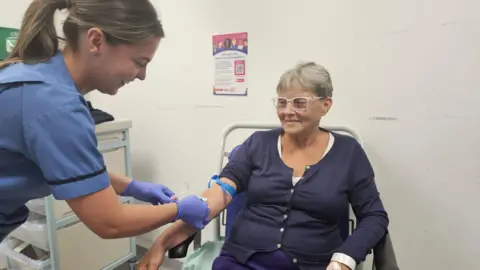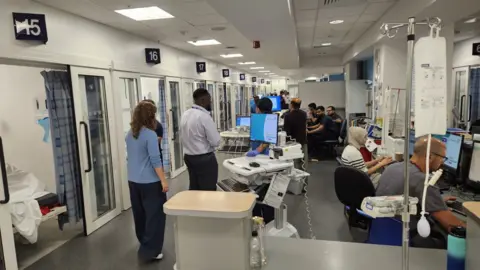Hospital expands HIV and hepatitis testing
 University Hospitals Birmingham
University Hospitals BirminghamAll patients requiring a blood test at Queen Elizabeth Hospital's emergency department will now tested for HIV and hepatitis.
The new protocol at the Birmingham hospital is expected to pick up undiagnosed patients, particularly from the South Asian community.
Earlier trials showed one in 300 patients had tested positive for hepatitis B.
The new service could save lives and cut treatment costs for the NHS.
Untreated hepatitis B and C causes liver damage and can lead to liver cancer.
Hepatitis B and HIV can be treated while hepatitis C can be cured.
Diana Pell, who was the first patient to be tested, said “I think it’s a good idea.
“I just hope that I haven’t got it.”
 University Hospitals Birmingham
University Hospitals BirminghamDr Steve Taylor, who has led the rollout for the University Hospitals Birmingham Trust, said many people did not know they were infected by diseases that could lie dormant for years.
“People go to places like Pakistan and Bangladesh and need medical treatment," he explained.
"They can have injections and can be infected with hepatitis B or C and not know about it.”
 University Hospitals Birmingham
University Hospitals BirminghamShabana Begum, who contracted Hepatitis C from an infected needle when she was a teenager, now works with the Hepatitis C Trust in ethnic minority communities and said the treatment for the illness was virtually painless.
She said: "What we are trying to do is overcome these stigmas and educate people.”
Emergency departments are extremely busy and the new test is designed so staff working there will only have to take one more blood sample.
Specialist nurses will analyse the results and if patients are found to be positive they will be called back for a second test and begin life-saving treatment.
More than 1,400 vials of blood will be tested each week and a new automated testing process has had to be set up.
It will later be rolled out across emergency departments in Birmingham and the Black Country.
Follow BBC Birmingham on Facebook, X and Instagram. Send your story ideas to: [email protected]
